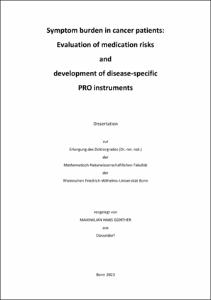Symptom burden in cancer patients: Evaluation of medication risks and development of disease-specific PRO instruments

Symptom burden in cancer patients: Evaluation of medication risks and development of disease-specific PRO instruments

| dc.contributor.advisor | Jaehde, Ulrich | |
| dc.contributor.author | Günther, Maximilian Hans | |
| dc.date.accessioned | 2023-04-27T13:49:11Z | |
| dc.date.available | 2023-04-27T13:49:11Z | |
| dc.date.issued | 27.04.2023 | |
| dc.identifier.uri | https://hdl.handle.net/20.500.11811/10785 | |
| dc.description.abstract | In oncology, adverse events are usually documented using the Common Terminology Criteria for Adverse Events (CTCAE). This physician-reported assessment can be supported by patient-reported outcomes (PRO) that play an increasing role in clinical drug development and practice. The National Cancer Institute (NCI) has developed a PRO version of the CTCAE criteria (PRO-CTCAE) for the detection of symptomatic adverse events in cancer patients. To minimize medication risks like adverse events for cancer patients, pharmacist-led medication reviews and medication management can be provided. This work consists of two projects focusing on the patient-reported symptom burden of cancer patients measured with PRO-CTCAE.
The aim of the first project was to determine sociodemographic, disease-related, and drug therapy-related factors influencing health-related quality of life (HRQOL) in oncology inpatients. The focus was on detecting medication risks with the help of a standardized medication review, including PRO-CTCAE data. The study was conducted retrospectively in a population of oncology inpatients at four study centers. The median age of the 162 patients was 65.5 years. They had various hematological and solid cancer diseases and received a mean of 11.6 drugs per patient. 92.6% of patients exhibited polymedication with five or more drugs. In the course of medication reviews a mean of 4.0 drug-related problems (DRPs) with need for intervention was detected per patient. 21.5% of those DRPs were identified based on PRO-CTCAE data. Multiple linear regression models describing changes of HRQOL from baseline to hospital discharge were found for the global HRQOL and the physical function of the patients including the relapse status (global HRQOL) and the duration of hospital stay (physical function) as covariates. The results may support the implementation of PRO-CTCAE in pharmacist-led medication reviews and multiprofessional care approaches for cancer patients. The aim of the second project was to develop PRO-CTCAE item sets with high content validity for patients with breast cancer, prostate cancer and multiple myeloma. Therefore, the prevalence and importance of therapy-associated symptoms, as well as their underlying tumor medication and disease-specific data, were assessed within a patient survey. In order to select PRO-CTCAE items for each tumor entity, individual symptoms were ranked on the basis of prevalence and importance. 101 patients with breast cancer, 107 with multiple myeloma, and 66 with prostate cancer were recruited at three study centers. The final breast cancer item set contains 21 symptoms, the multiple myeloma and prostate cancer item set 19 symptoms each. The symptoms with the highest rankings across the item sets were fatigue and sleep disorders. An item redundancy analysis identified symptoms of the PRO-CTCAE item sets that may be redundant. The PRO-CTCAE prostate cancer item set exhibited the most possible redundancies. After further validation studies, the new PRO-CTCAE item sets will be applicable for use in clinical studies as instruments for safety assessment. Based on the results of the two projects, complex interventions to improve health outcomes of cancer patients can be developed, combining electronic recording of PROs and medication reviews with other safety-increasing measures. | en |
| dc.language.iso | eng | |
| dc.rights | In Copyright | |
| dc.rights.uri | http://rightsstatements.org/vocab/InC/1.0/ | |
| dc.subject | PRO-CTCAE | |
| dc.subject | Symptomlast | |
| dc.subject | Krebspatienten | |
| dc.subject | Onkologie | |
| dc.subject | Medikationsanalyse | |
| dc.subject | symptom burden | |
| dc.subject | cancer patients | |
| dc.subject | onkology | |
| dc.subject | medication review | |
| dc.subject.ddc | 500 Naturwissenschaften | |
| dc.title | Symptom burden in cancer patients: Evaluation of medication risks and development of disease-specific PRO instruments | |
| dc.type | Dissertation oder Habilitation | |
| dc.publisher.name | Universitäts- und Landesbibliothek Bonn | |
| dc.publisher.location | Bonn | |
| dc.rights.accessRights | openAccess | |
| dc.identifier.urn | https://nbn-resolving.org/urn:nbn:de:hbz:5-70586 | |
| ulbbn.pubtype | Erstveröffentlichung | |
| ulbbnediss.affiliation.name | Rheinische Friedrich-Wilhelms-Universität Bonn | |
| ulbbnediss.affiliation.location | Bonn | |
| ulbbnediss.thesis.level | Dissertation | |
| ulbbnediss.dissID | 7058 | |
| ulbbnediss.date.accepted | 24.04.2023 | |
| ulbbnediss.institute | Mathematisch-Naturwissenschaftliche Fakultät : Fachgruppe Pharmazie / Pharmazeutisches Institut | |
| ulbbnediss.fakultaet | Mathematisch-Naturwissenschaftliche Fakultät | |
| dc.contributor.coReferee | Schuler, Markus | |
| ulbbnediss.contributor.orcid | https://orcid.org/0009-0000-8233-7712 | |
| ulbbnediss.contributor.gnd | 1289427208 |
Dateien zu dieser Ressource
Das Dokument erscheint in:
-
E-Dissertationen (4466)




